A million front-line workers to receive $487 each
By Trisha Ahmed Associated Press
ST. PAUL, Minn. (AP)
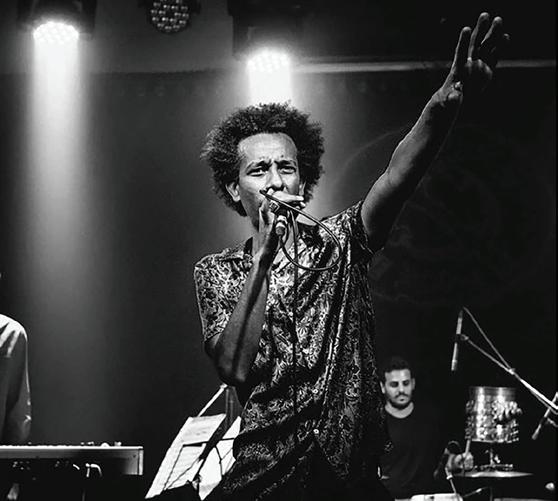
— More than 1 million Minnesotans have qualified for bonus checks to frontline workers to recognize their work during the COVID-19 pandemic, but the payments will be for less than $500, the governor’s office announced Monday.
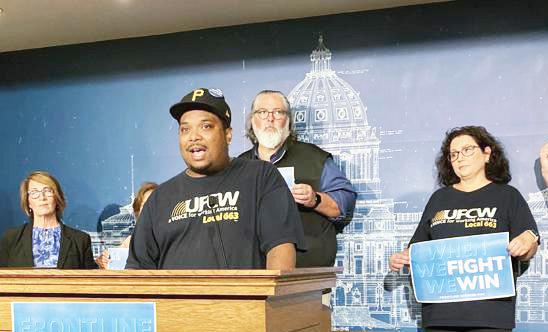
The state will start sending out the payments on Wednesday. The Legislature approved a total of $500 million for eligible applicants, and Gov. Tim Walz signed it into law in April.
“To a working family, $500 is very meaningful … it will be a boost for my family
and many other families,” said Gene Sparks, an EMT who worked at St. Francis Regional Medical Center in Shakopee during the pandemic.
Many frontline workers faced long shifts, uncertain procedures and constant threats of infection that kept them worried throughout the day and sleepless at night during the first year of COVID-19, he added.
“The payments made this week should only be the start of the gratitude that our state shows,” Sparks said. “But today, we take a moment to pause and celebrate this win.”
Nearly 1.2 million applications were submitted during the
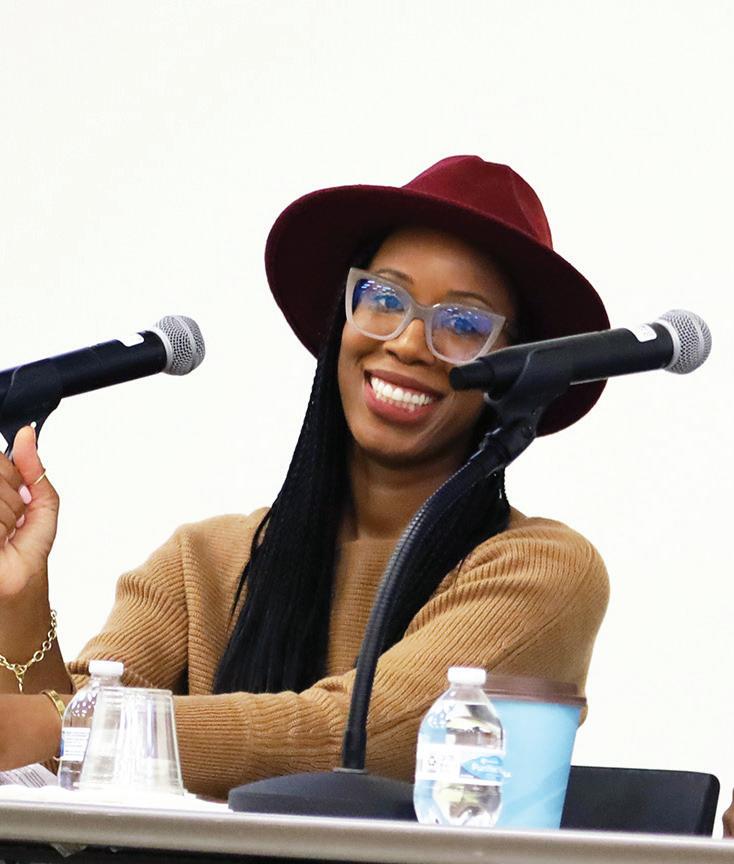

45-day application period this summer. The state approved 1,025,655 of them, which means the individual payments will be $487.45.
Every person who applied will receive an email by Wednesday informing them of whether or not they were approved, and next steps, said Nicole Blissenbach, temporary commissioner of the state Department of Labor and Industry.
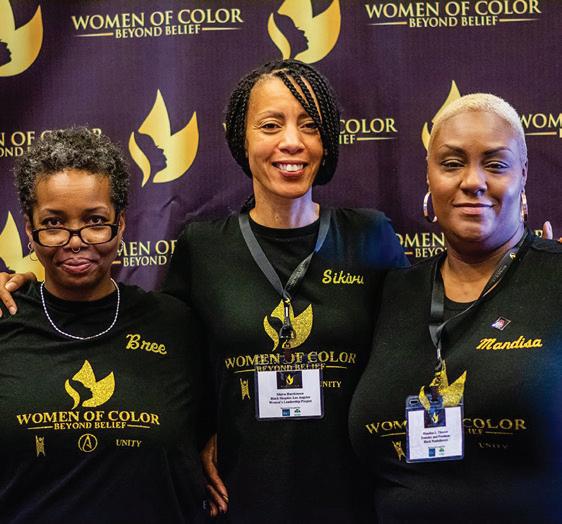
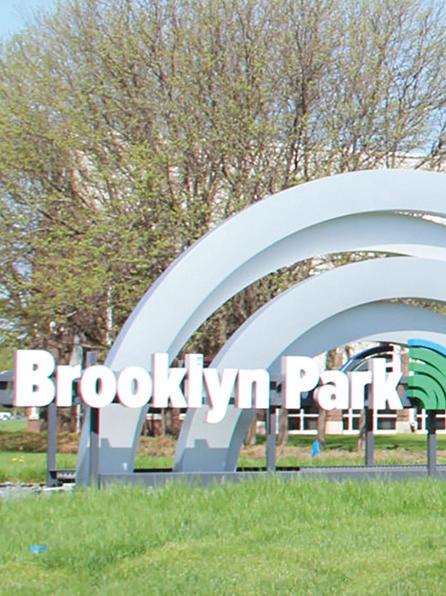
Frontline workers who chose direct deposit should get their money within seven to 10 business days; those who chose to get their payments via debit cards will get them within three to four weeks.
The money is subject to federal income tax but not state income tax, Blissenbach added. State officials originally estimated the final pool of qualified workers would be around 667,000 with payments of about $750 apiece, but applications exceeded expectations. Democrats pushed for $1 billion in payments but eventually compromised with Republicans for $500 million. The deal marked one of the few big bipartisan successes of the 2022 legislative session, which was marked mostly by stalemates over how to spend a $9.25 billion
P.6 African immigrant professionals on breaking glass ceiling
OCTOBER 10-16, 2022Issue # 543 www.mshale.comINSIDE THE AFRICAN COMMUNITY NEWSPAPER
Five takeaways from the Brooklyn Park mayoral forum
P.4 P.9
P.10 Review: Gili Yalo concert in Minneapolis
Women of color on Christian nationalism and reproductive rights
See Front-line on Pg. 5
Keith Farr, a supermarket meatcutter and member of the United Food and Commercial Workers union, tells reporters at a news conference at the State Capitol in St. Paul, Minn., on Monday, Oct. 3, 2022, how the bonus payments going out to Minnesota frontline workers week will help him. The governor’s office on Monday announced that more than 1 million frontline workers have qualified for bonus checks to recognize their work during the COVID-19 pandemic. The payments will be $487.45 apiece.
Photo: Steve Karnowski/AP
Celebrating Houston White
The Houston White for Target collection is an exciting collaboration that shows the importance and possibilities of working together to move culture forward. This collection is distinct, stylish, and inclusive to all. Houston believes your style is a celebration of who you are. When we celebrate passion and style from unique perspectives, we cultivate stronger communities.
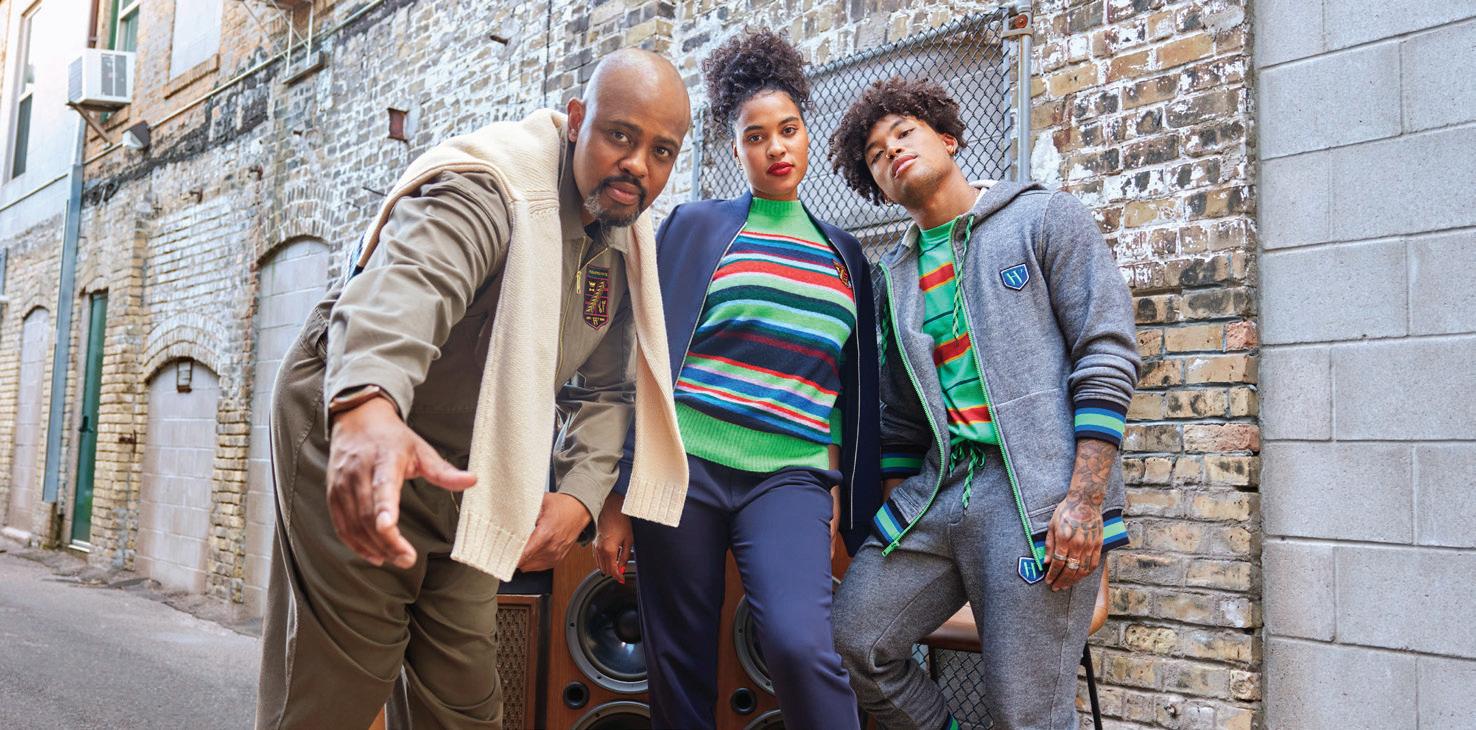
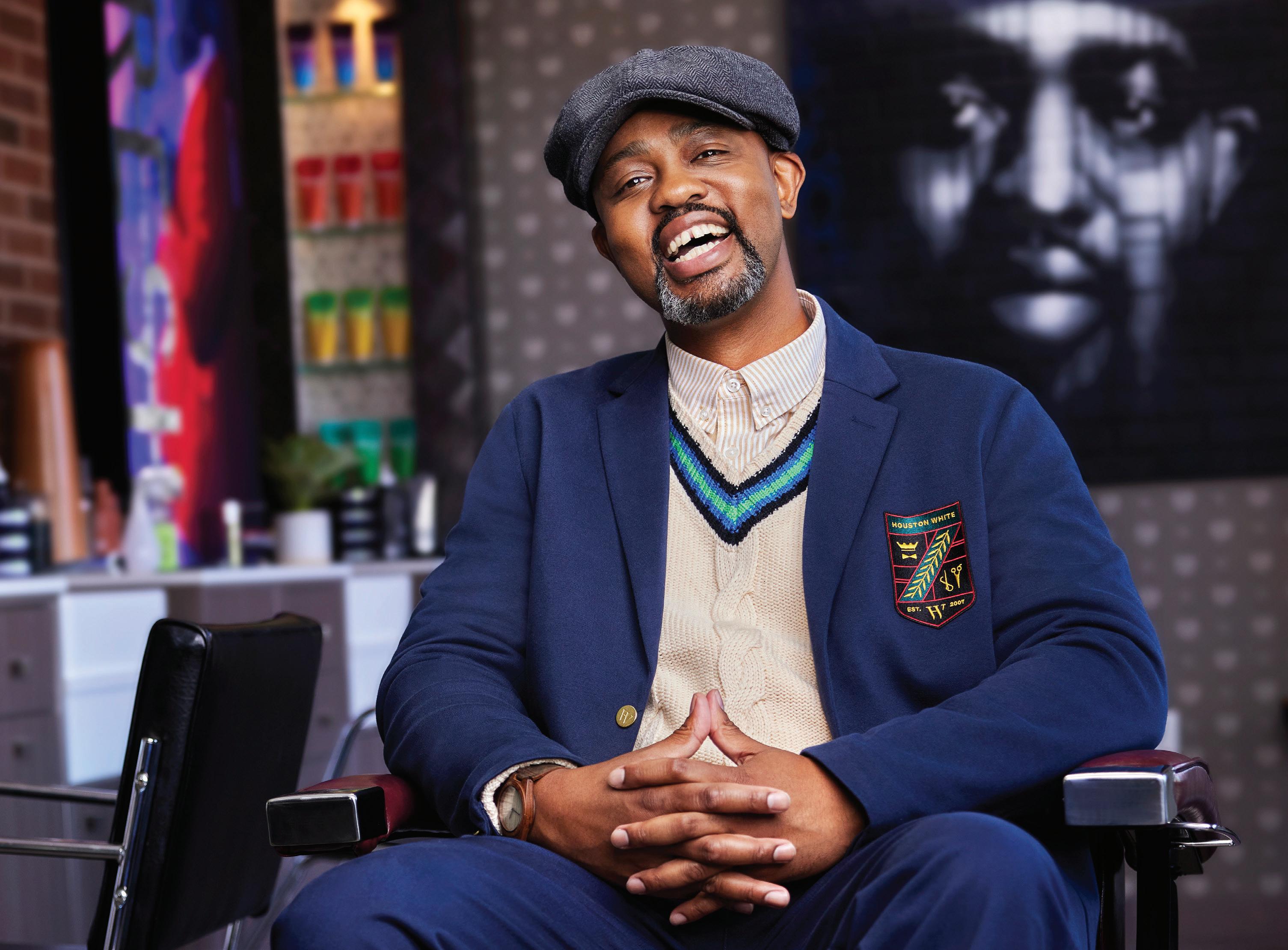
Investing in ourselves, makes us all shine.
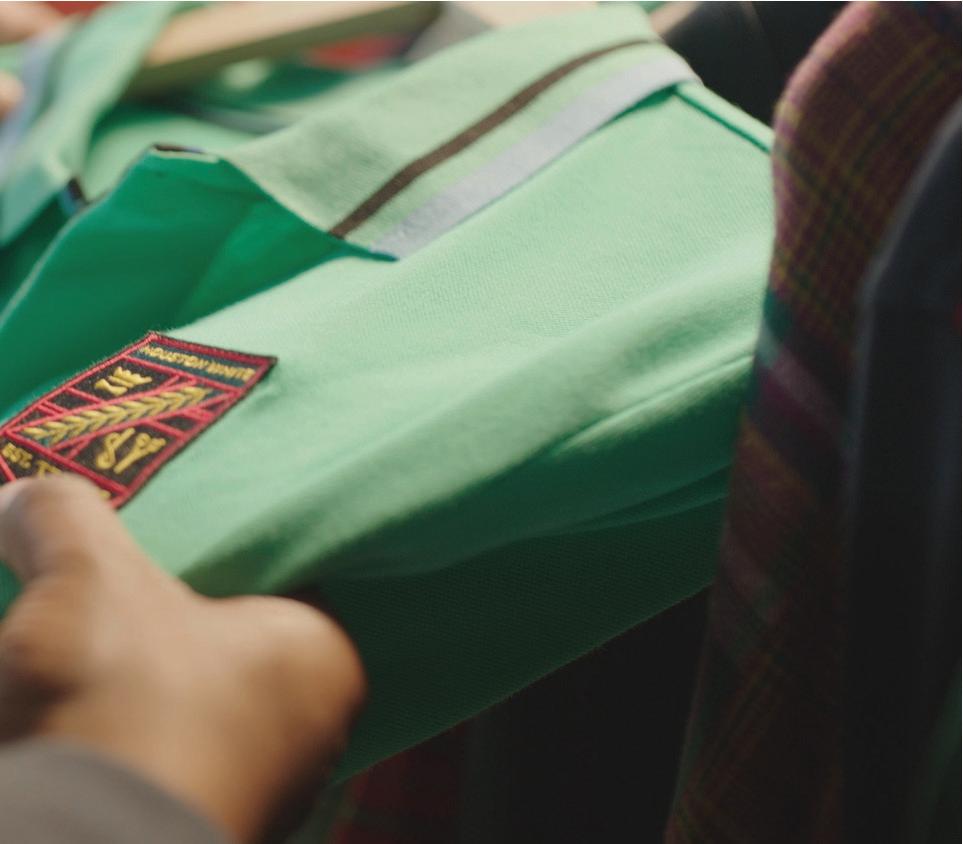
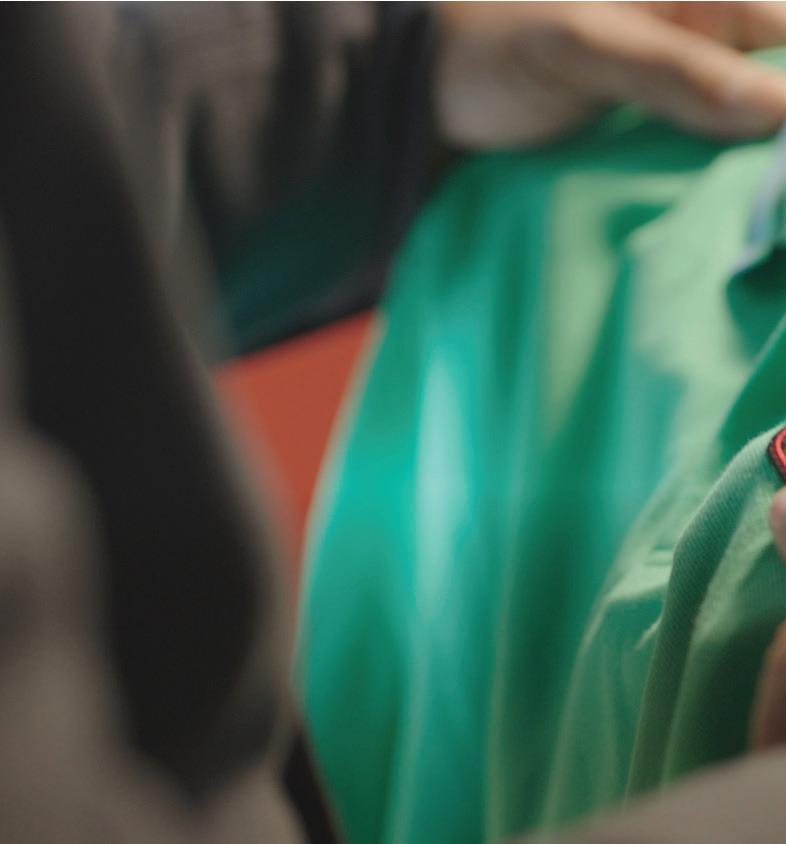
- The African Community Newspaper www.mshale.com October 10-16, 2022 Issue 5432Mshale
get inspired by Houston White’s story
@2022 Target Brands, Inc.
Guest Commentary by Ben Jealous
recruiting is a national
Our military’s recruiting efforts have clearly reached crisis mode. All our services are facing challenges in meeting their goals. The services combined needed to recruit about 150,000 new recruits this year across its six services. That goal will not be met, coming up 15% short. The Army is clearly facing the most severe problem, as it has met only about 60% of its target.
A tight labor market is clearly not helping recruiters, but a bigger problem is simply the shrinking pool that recruiters can draw from. Of the 32 million young Americans who are age-eligible for service, only 9.1 million meet the initial requirements. Of those, only 4.4 million meet academic requirements. The pool is further reduced by those who have police records, drug/substance abuse issues or are obese. Those factors shrink the initial poor of 32 million to 465,000 attractive recruits, many of whom will have opportunities in the private sector.

Recent Army data showed that up to 70% of potential recruits interested in Army service are disqualified in the first 48 hours due to obesity, low test scores or drug use.
Adding to the challenge is the propensity to serve. When young people are asked, “How likely is it that you will serve in the military?” only 11% responded “definitely or positively.” Recruiting is not helped when 52% of parents do not recommend military service to their offspring.
With those facts being said, it was very disappointing recently for Secretary of the Army Christine Wormuth to blame the media for exacerbating the recruiting crisis. Ms. Wormuth, speaking to a group of soldiers, said the media hurts recruiting when it discusses a range of problems the military is dealing with such as sexual assault and mental health issues. She says resultant coverage of these issues creates a warped sense of the services.
Respectfully, Ms. Wormuth was pointing her finger at the wrong entity. The media have been simply doing their job of covering a range of issues that need to be discussed — some that leadership should have resolved years ago. For example, the services have faced the sexual assault issue for years, perhaps decades. Still, sexual assault across the services rose 13% in 2021. The Army rate, as a matter of note, rose 26% compared with the previous year. Is it any wonder parents are reluctant to recommend the military when they hear these reports?
Similarly, reports of mold, vermin, leaking roofs and poor living conditions in military housing and barracks have been documented for years. Yet many of the problems continue.
Where has leadership been on these issues? Why have these problems continued unabated? Leadership should have stepped in and solved these years ago. Instead, they have lingered on, having a deleterious effect on recruiting.
At Fort Stewart in Georgia, mold in a barracks encrusted entire rooms and soldiers’ belongings. Soldiers told a military publication leadership did not listen to their complaints. So they went to the media because as one soldier said, “That’s the only way senior leaders are going to know they failed.”
Military recruiting and meeting goals does not just fall on the recruiter. It’s an “all hands on deck” issue, and it starts at the top.
Instead of blaming the media, Ms. Wormuth, her service counterparts and our political leaders need to treat recruiting as a national security issue.
The fact that many potential recruits cannot pass the most basic educational test is also a sad commentary on our national educational system. The Army is accepting potential recruits who don’t qualify academically and sending them to a six-week remedial program so they can pass the entrance exam.
It’s not surprising then that the most recent results of the Program for International Student Assessment (PISA), a worldwide study of academic performance by 15-year-old students, showed the U.S. ranking 25th in average mathematics, science and reading. China ranked No. 1.
An Army official recently said the service saw a 10% drop in aptitude test scores during the pandemic, and that number dipped further to 13% this year.
More worrisome is what awaits academically in the long term. The Department of Education recently looked at test-score trends of fourth graders since the pandemic. What they found was the worst drop in math and reading scores in decades — not a good indicator for the future. A professor of sociology and education at Columbia University sounded an ominous warning: “I don’t think we can see these 9-year-olds catching up by the time they leave high school.”
Our recruiting crisis should serve as a wake-up call to every American — and certainly for every political leader, starting with our president. Our armed services are struggling to meet recruiting goals like never before. As a result, we are facing a national security crisis that must be addressed now. It’s not the fault of the media that we have reached this extreme situation.
- The African Community Newspaper www.mshale.com October 10-16, 2022 Issue 543Mshale 3
Tom Jurkowsky is a retired Navy rear admiral who served on active duty for 31 years. He sits on the board of the Military Officers Association of America, an advocacy organization that supports a strong national defense and its people. He is the author of “The Secret Sauce for Organizational Success: Communications and Leadership on the Same Page.”
Join the Mshale Text Club: Text AFRICA to 24587 or follow us onTwitter.com/Mshale Community News, updated daily on Mshale. com Military
security crisis © 1995-2022 Mshale Communications, Inc. Mshale – The African Community Newspaper Editorial & Corporate Office: 2 E Franklin Ave., Suite 1 Minneapolis, MN 55404 Mailing Address: P.O.BOX 80071, Minneapolis, MN 55408 Tel: 612-454-5648 Email: mshale@mshale.com www.mshale.com President & Publisher: Tom Gitaa Contributing Editor: Edwin Okong’o Staff Writers: Kari Mugo, Bethel Gessesse, Cynthia Simba, Panashe Matemba-Mutasa Contributing Writers: Susan Budig Design & Layout: Staff Photographers: Richard Ooga, Bethel Gessesse, Jasmine Webber Distribution: Bluebird Mshale is published weekly on Monday. It is available every Monday for free at most African stores , African restaurants and metro area county libraries. Mailed subscriptions are $60 per year. Memberships: Minnesota Multicultural Media Consortium (MMMC) , Pan African Business Alliance (PABA). The editor welcomes letters, opinion pieces and commentary on issues of interest to the African community in North America. Contributions must be typed and will be edited for clarity and space. Submissions can be mailed or submitted online at www.mshale.com
Ranked voting, crime, leadership: Takeaways from the Brooklyn Park candidate forum
 By Tom Gitaa Mshale
By Tom Gitaa Mshale
The League of Women Voters on Tues day decided to combine mayoral and Council candidates in Brooklyn Park in the same forum, denying voters who will in November elect their first Black mayor, a chance to scrutinize the two mayoral can didates up close. Still, the limited time the two mayoral candidates, Hollies Winston and Wynfred Russell, answered questions from the moderator yielded some insight into how they will approach the office of mayor.
Participating candidates for City Coun cil were Christian Eriksen and Indred Alex ander who are vying for the East District; Teshite Wako who is running in the Central District, his opponent Nichole Klonowksi did not participate; Maria Tran who is run ning in the Central District, her opponent Tonya West-Hafner did not participate.
Here are five takeaways from the forum:
Crime takes centerstage
An MPR News/Star Tribune/Kare 11 poll released on the eve of Tuesday’s forum that surveyed 800 registered Min nesota voters and conducted by Mason Dixon Polling found 54% thought crime had increased in their community and 45% stating it stayed flat. During the pan demic rising crime rates, or perceptions of it, have dominated the news cycles and is a subject candidate from the gov ernor and down ballot races have had to address.
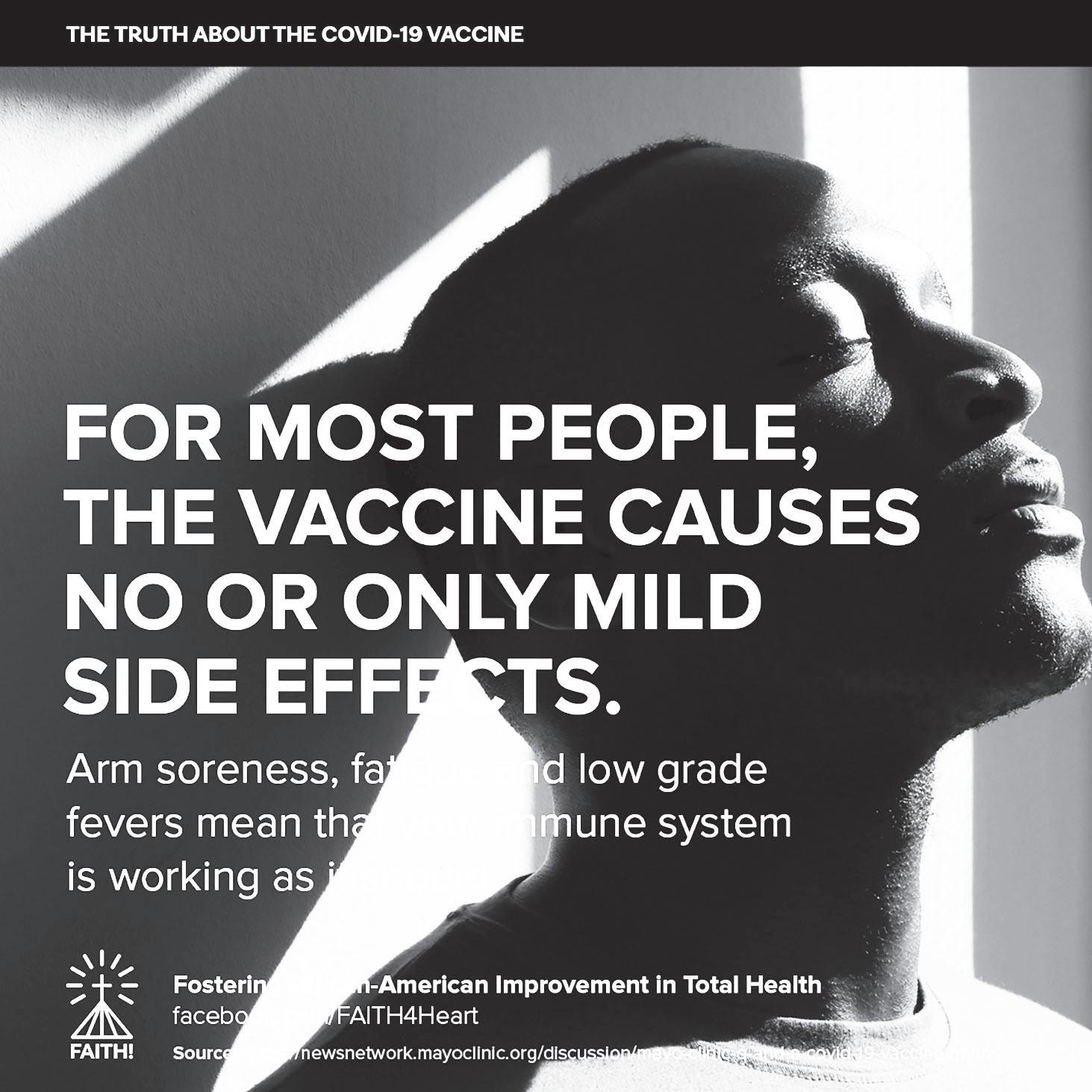
On Tuesday when asked how they will address crime all candidates with the exception of Russell espoused the com munity policing strategies of building bridges with the community and espe cially the youth. They all without exception also pledged their support for the police, a standard requirement for any serious candidate running in a suburban Ameri
can city nowadays.
Winston on his part promised “to con tinue to fully fund the police. I mean, that’s obvious,” adding that there should always be a youth component to the strategy.
His computer for mayor, Wynfred Rus sell, said there were already “a lot of youth programs” and the problem as he sees it are the lenient county prosecu tors who let criminals off saying “When we arrest kids here, folks here and send them to Hennepin County, they get out of jail with a slap on a wrist.” Echoing a common talking point among metro area police chiefs and conservative politicians.
Russell said more prosecutions are needed.
Russell’s response drew a sharp rebuke from Indred Alexander who is running for the East District Council seat.
“I just want to say I’m kind of disap pointed in that answer of wanting to do more prosecution. We’re not seeing a rise in crime because people aren’t being prosecuted enough,” Alexander said. “We’re seeing a rise in crime because these children are dealing with issues. There’s a lot of mental health issues.”
Majority of them are not too hot on Ranked Choice Voting
A surprising topic that came up at the forum was the Ranked Choice Voting sys tem (RCV) when moderator Carol Barclay asked “Do you think ranked-choice voting is the most democratic means of select ing candidates? And if not, why not?”
Under the RCV system, voters rank can didates in order of preference and it has been credited with lessening polarization at the polls, as candidates are forced to reach out to a broader pool of voters than just their supporters. In Minnesota, five cities currently use the system for their local elections: Minneapolis, St. Paul, St.
Louis Park, Bloomington and Minnetonka. Minneapolis was the first one to imple ment it in the state back in 2013.
None of the candidates on Tuesday came out in opposition to the system, instead opining that it might confuse vot ers and that the voters might not be too familiar with it. Only Alexander offered a full endorsement of the process pointing out the story of Mary Peltola who defeated Sarah Palin and, in the process, made his tory last month as the first Alaska Native and first woman to be elected to that state’s lone seat in the U.S. House. Alas kans voted in 2020 to adopt RCV.
Eriksen probably summed up the think ing of most at the forum when he said “Those who support ranked-choice voting have a big education job ahead of them before I would be comfortable support ing that as a electoral process going for ward.”
They all love the police
Candidates were asked to describe the current state of relationship between the police department and the community.
Eriksen: “I would say that I’ve already felt some tangible improvement in how the community looks at our police depart ment and how our police officers feel about themselves.”
Alexander: “I’m optimistic as well with the relationship with the city (of Brooklyn Park) and the police department.”
Wako: “Public safety is a concern of all of us, and we all need to be safe. And for that, we need to support a law enforce ment and a police that’s accountable and transparent.”
Winston: “I’ve actually met with our new police chief (Bruley) and I’ve been impressed with some of the work he’s been doing in Huntington Place. I think one of the crown jewels over there is the organization called The Village, and he’s been amenable to working with him, to have the police come interact with the community once a week.”
Tran: “I agree with Teshite. In additional, I hope that and I think that we still have to put more effort into the law enforcement and community relationship.”
Russell: “I have a very excellent rela tionship with the police department and with our law enforcement as a whole, I received the endorsement of the fire, Brooklyn Park Professional Fire Depart ment.”
You can watch the full forum on Mshale. com.
They all want to improve transpor tation within the city
Almost all of those at Tuesday’s forum promised to work to improve the ability of city residents, especially the youth and seniors, to commute within the city.
Wako and Alexander pointed out the need to ensure one can commute from one end of the city to the other if they don’t have a car, with Eriksen suggesting the city come up with a circulator that can make transiting within the city easy.
Russell pointed out that the city is already doing a lot towards improving mobility within the city and boasted that “I’m not coming into the mayor position, telling you what I will do. I’m coming into the mayor office telling you what I am cur rently doing and what I will continue to do.”
Wynfred Russell is not a fan of Brooklyn Center Mayor Mike Elliott’s leadership
As is the case with many of these forums where candidates don’t directly engage each other in intense debate, not much fireworks emanate from them. But on Tuesday, Russell decided to throw a firebomb across city lines as the forum concluded.
In his closing statement, Russell argued it is important to have experience before one becomes mayor, otherwise, “I think that we all can see or have seen that experience matters. We see what is hap pening to our neighbors next door.”
Although he did not mention names, it is unlikely Russell was referring to the mayors of Maple Grove, Champlin, Osseo or Crystal – cities that share a border with Brooklyn Park, and have mayors with varying experiences either as mayors or Councilmembers prior to being elected to their current terms.
The only other city bordering Brooklyn Park will be Brooklyn Center, which has been in the eye of the storm following the police killing of Daunte Wright, but has since quieted down. Mayor Mike Elliott, a Liberian American like Russell, is winding up his first term this November and is up for reelection.
Outside of groups that believe police officer Kim Potter should not have been prosecuted for killing Daunte Wright, many credit Elliott with leading the city through the crisis and providing the needed leadership.
Russell went on “When you have some one who doesn’t have that experience in this position and the track record and built the relationship that we have built over the years, what we see happening next door, I’m afraid it may happen to us here in Brooklyn Park.”
The NAACP (National Association for the Advancement of Colored People), the nation’s oldest and largest civil rights orga nization, clearly does not share Russell’s view of Mayor Elliott. Three days before the candidate forum, at its Freedom Gala, it presented Elliott with an award for his years of service and commitment to the community.
- The African Community Newspaper www.mshale.com October 10-16, 2022 Issue 5434Mshale
A sign directs voters on a voting location in Brooklyn park during a special election in April 2022.
Photo: Jasmine Webber/Mshale
budget surplus.
Eligible workers include those in the long-term care and home care industries, health care, the courts, child care, public schools, retail, food service, public transit and manufacturing.
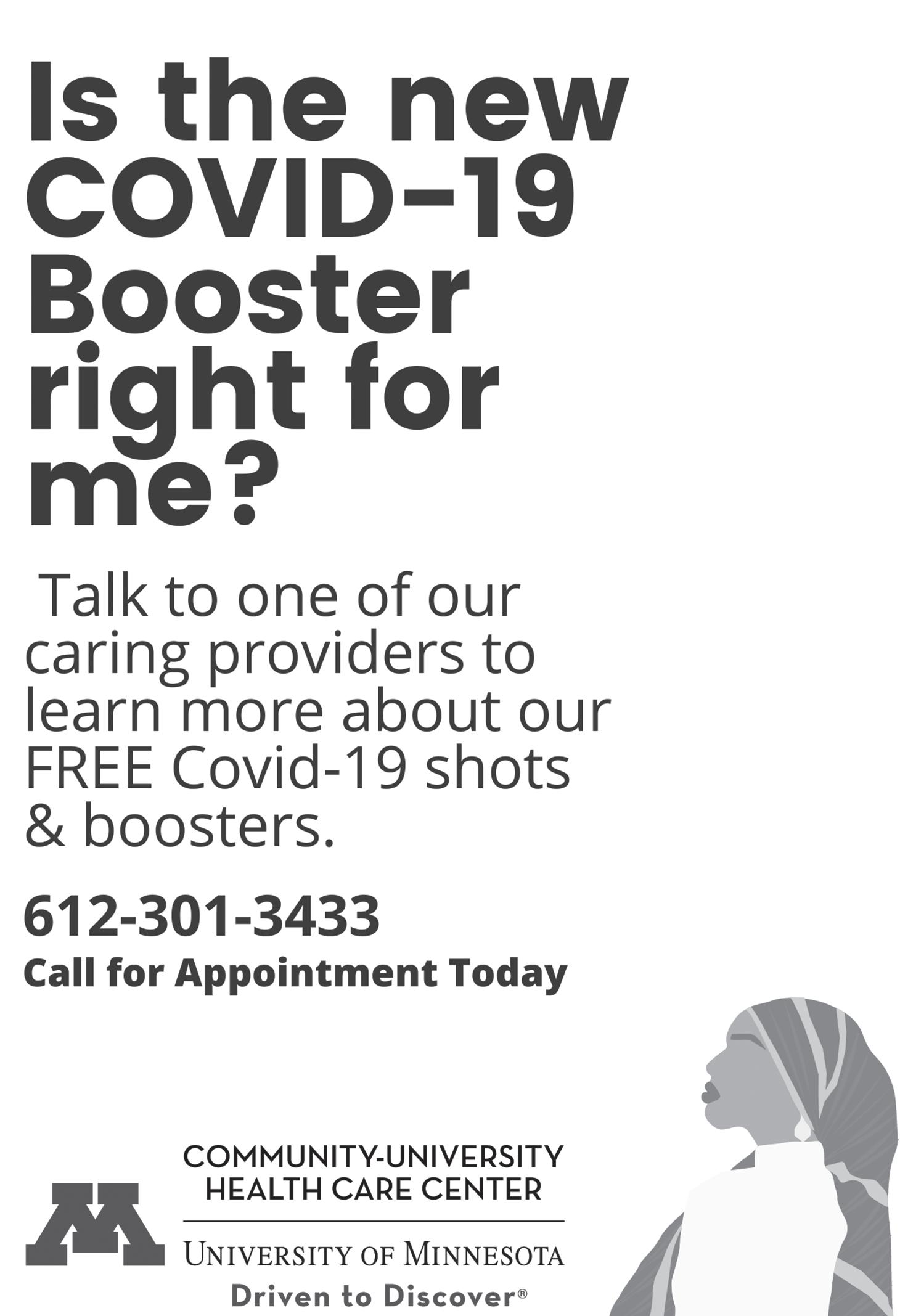
“I’m just happy that we’ll finally get this payment,” said Keith Farr, a meat cutter at a Lunds & Byerlys supermarket.
He said a particularly difficult time was during the stay-at-home order when his three daughters — ages 16, 13 and 10 — were at home and attending school online at the beginning of the pandemic.
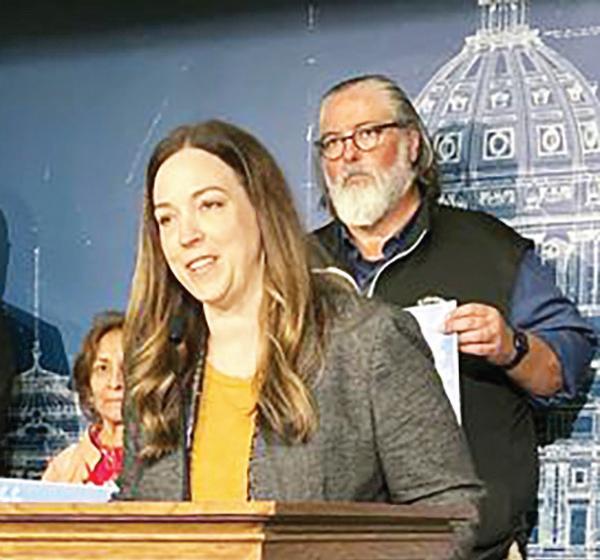

“It required more food. It was hard for the girls to stay focused.
It was tough,” Farr said. His wife stopped working in order to support their daughters, “and it cut our income in half at the time that it was most needed.”
Farr said he plans to use his frontline worker check toward rent. He said he would’ve liked the check to be a little bit more, but that the $487 is better than nothing.
When asked if legislators might approve more money for frontline workers, given that Democrats had to settle for less than they wanted, Democratic Rep. Cedric Frazier, of New Hope, said, “I personally believe we should take more action … but we’ll have to see what that looks like in the next session.”
Democratic Sen. Erin Murphy, of St. Paul, added that frontline worker pay is an important
provision, but the state is still experiencing workforce shortages in education, nursing homes and health care — issues that also require attention from legislators.
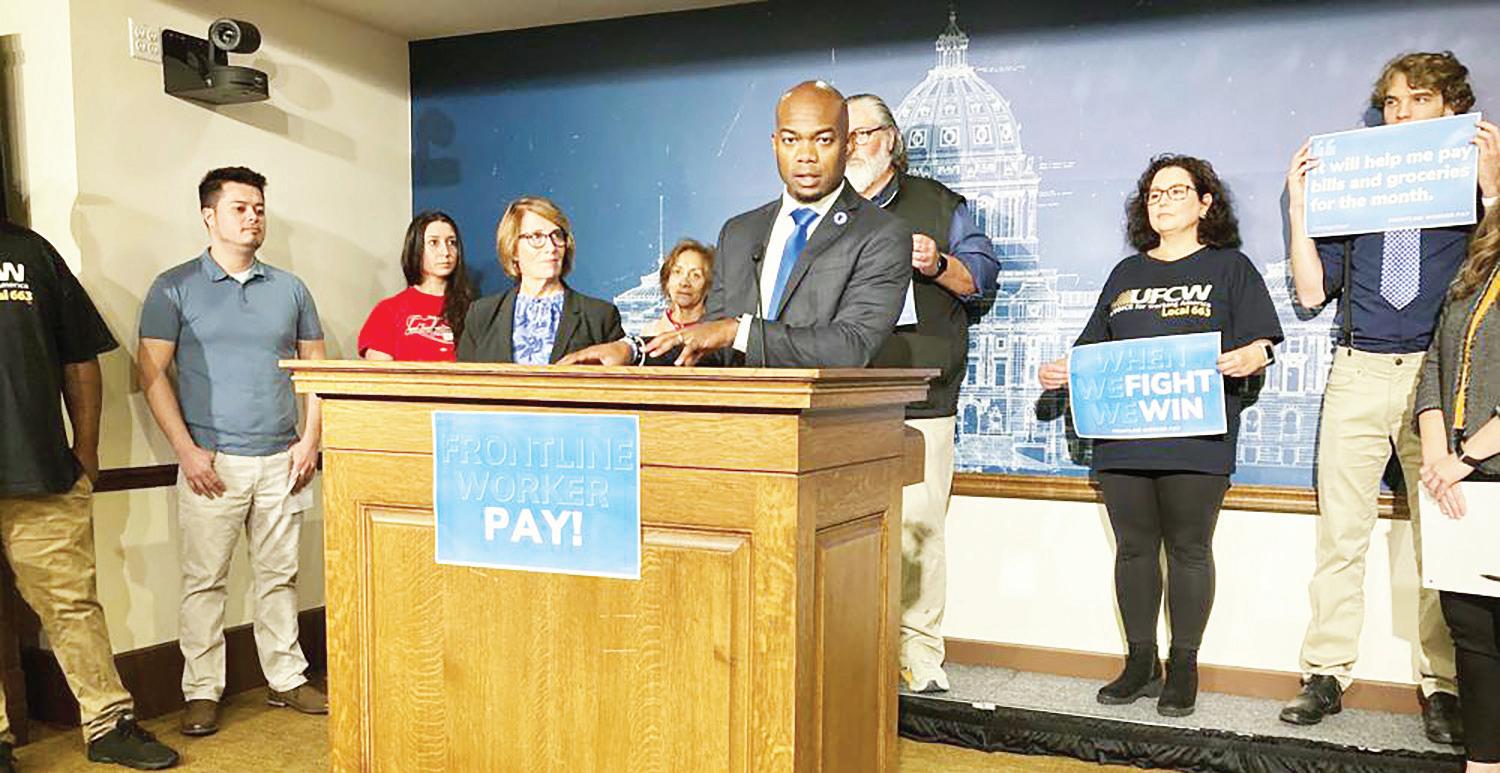
- The African Community Newspaper www.mshale.com October 10-16, 2022 Issue 543Mshale 5
Front-line Continued from Pg. 1
Democratic State Rep. Cedrick Frazier, of New Hope, speaks at a news conference at the State Capitol in St. Paul, Minn., on Monday, Oct. 3, 2022. The governor’s office on Monday announced that more than 1 million frontline workers have qualified for bonus checks to recognize their work during the COVID-19 pandemic.
Photo: Steve Karnowski/AP
Nicole Blissenbach, temporary commissioner of the Minnesota Department of Labor and Industry during the news conference.
Photo: Steve Karnowski/AP
Mshale Text Club: Text AFRICA to 24587 to join
African immigrant professionals call on community to break glass ceiling
 By Panashe Matemba-Mutasa Mshale
By Panashe Matemba-Mutasa Mshale
The African Immigrant Professional Development Conference (AIPDC) returned to the Twin Cities Saturday, as professionals from the public and private sectors came together to find ways Afri can immigrants can overcome barriers in career development.
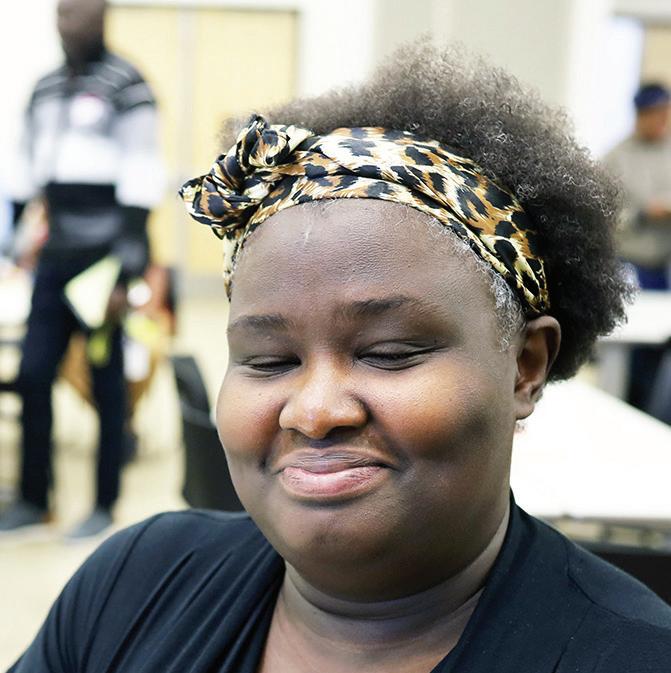
“Navigating Change,” was the theme of this year’s conference, which was held at North Hennepin Community College in Brooklyn Park. It sparked a conversation about how to break common barriers that prevent African newcomers to Minnesota from achieving career and economic advancement.
“There are real hurdles that we face,” said Wokie Daboh, the director of diver sity and inclusion at ESPN, in her keynote speech.
As Minnesota’s population demograph ics continue to change, so does its workforce. According to a 2020 study published by the Minnesota Department of Employment and Economic Devel opment (DEED) Minnesota is home to around 400,000 residents who identify as Black or African American, 125,000 of whom were born in Africa. Nearly 50% of Black residents live in households with an income below $50,000. The goal of this year’s AIPDC was to investigate the root cause of these disparities and formulate
solutions for a brighter future for Minne sota’s African immigrants.
Daboh, who calls herself a “proud Liberian Minnesotan,” spoke about a cul ture of insularity that she had witnessed among Liberians and other African immi grant communities. Her parents worked hard to instill in her a sense of pride in her heritage, which helped her form her sense of identity. Though she appreciated the sense of community, she said there were lost opportunities to connect with others outside of the community to net work and build professional relationships.
“When I entered into the working world, it was very hard to form those necessary connections,” Daboh said.
Still, Daboh acknowledged the value of retaining one’s culture and not losing one’s identity to fit into the American pro fessional world. A study by Stanford’s Institute for Economic Policy Research found an increasing percentage of immi grants opting for “less foreign” sounding names for their children, and the effects are significant: those with foreign sound ing names completed fewer years of schooling, earned less, and experienced higher rates of unemployment and job discrimination than their American-named peers. But for Daboh, the uniqueness of her name is cause for celebration.
“My mother gave me a name where I could not hide who I was and where I
came from,” she said.
“It’s a strong part of my identity, as my name is very specific to a tribe.”
On the topic of choosing between assimilation and authenticity, Daboh said that it was important to strike a balance. Stepping foot onto new soil should not undo the uniqueness of one’s heritage and culture, she said.
“I’ve had so many Black women who look like me, who said that seeing me on a call with my headwrap inspired them to bring their authentic selves to the job, and that is so important,” Daboh said.
Jerome Wesson, a Liberian immigrant and technician at Boston Scientific, said that breaking out of insular cultural circles would require many African immigrants to step out of their comfort zones. Wesson said that he often felt out of place “like a piece of mold on white bread” when navi gating predominantly white spaces. Still, he said the initial discomfort is necessary in expanding one’s professional network. But African immigrants must be proactive about being seen and having their voices heard because it is not enough to just be in the spaces, he said.
“We are smart,” Wesson said. “Don’t let people tell you that you don’t belong here. And don’t just get to the table; be an active participant at the table.”
Thomas Tapeh, a former NFL fullback
from Monrovia, Liberia, talked about les sons he had to learn as an immigrant in a major sports league. Though the pay was more than generous, Tapeh said he had to adjust and work hard to gain financial literacy. He said many immigrant profes sionals often do not come with the knowl edge about wealth building strategies.
“As a Liberian immigrant in the NFL, I was kind of on my own, and there was no one to teach me about the value of investing,” Tapeh said.
- The African Community Newspaper www.mshale.com October 10-16, 2022 Issue 5436Mshale
See Professionals on Pg.
8
Asneth Omare reacts to proceedings at the African Immigrant Professional Development Conference on Saturday, October 1, 2022 held at North Hennepin Community College.
Photo: Panashe Matemba-Mutasa/Mshale
GET TODAY PAST-DUE MORTGAGE PAYMENTS? Apply at HomeHelpMN.org or call 1-800-388-3226
Insured by NCUA
- The African Community Newspaper www.mshale.com October 10-16, 2022 Issue 543Mshale 7 GOOD SERVICE GOOD RATES
Nancy Omondi, a Kenyan immigrant and director at DEED, talked about the challenges she faced when she became unexpectedly pregnant out of wedlock in college. Overcoming that ignited a passion in her to advocate for the women and girls in the African com munity who may be silent about their struggles out of fear for being shamed. One of her professional goals was to continue to help people reach their full est potential by equipping them with the resources they need, she said.
“At work I am on a team, and I have a responsibility to help others,” Omondi said. “I have to ask myself every day, ‘What does this person need the most to help them get to where they need to be?’”
Jeff Peal III, an information security offi cer at Clinician Nexus, said that the key to Black and African immigrant prosperity in Minnesota was to explore more career opportunities. Peal, who oversees infor mation technology (IT) departments, said he observed the gap in America’s hightech industry. Additionally, Peal strives to address this gap by presenting these opportunities to Black people whenever he can.
“There’s just not many that look like me in the field,” Peal said. “It’s been inten tional on my part to encourage African and African American men and women move into IT, and there is a wealth of opportunity for us to explore.”
According to Zippia, the career consult ing and research firm, Black people only make up 7 % of workers in the high-tech field, even though they are 13% of the
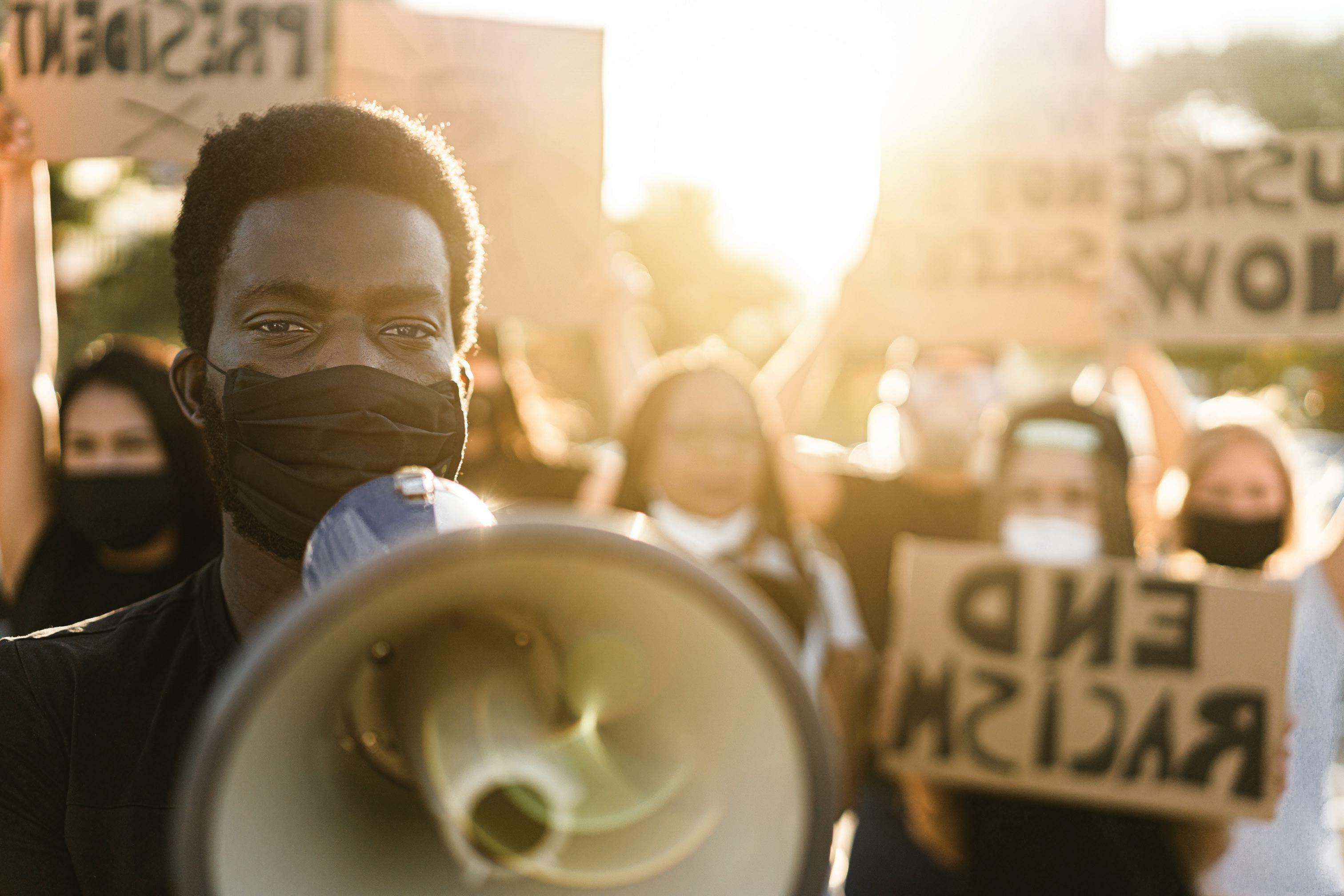
U.S. population.
Brooklyn Park resident and entrepre neur, Oluwatobi Oluwagbemi, said she was inspired to attend the conference because she is passionate about address ing issues of the African community. In her two years of running a business con sulting firm, she was proud to help every one, but said she was especially proud to see those who look like her flourish in their professions.
“I believe it is important for people who look like me to be represented at the table,” Oluwagbemi said. “I want my people to be successful.”
Financial coach Asneth Omare, said that she’d gotten the invitation to the con ference a few times in the past and was excited about finally being able to make it. Omare was inspired when the panel ists delved into the discussion of invest ing and financial literacy, a conversation
she said was often missing in the African community.
“My work is centered around teaching people how the stock market works so that the layperson can understand it, and I think that’s crucial for our community,” Omare said.
Jenkins Vangehn, a fellow at Harvard Kennedy School, said that he felt lucky to have learned a lot at the conference. He said it was important for the event to feature accomplished African figures to tell their stories and give advice. He was most moved by research shared about the extent of employment and earnings disparities when compared to other com munities.
“The stats honestly shocked me,” he said. “Even African immigrants who are educated and working are struggling. It should not be like that,” Vangehn said
Esther Muturi, a Kenyan immigrant, said professional underdevelopment was among the most pressing disparities. She learned a lot of valuable informa tion, which she intended to take back and share with other Africans in her circle, she said.
“I am ambitious, and I think it’s impor tant to spread this information within the community so that we can grow,” Muturi said.
Veronica Lewis-Barr, a Liberian com munity member, said she had known of the conference since Covid, but was most motivated to attend now that it was in-person. Events like the AIPDC could give African immigrants the networks and resources needed to compete in a fierce job market, she said.
“We need to have these dialogues to help each other, because when we do that, everybody in the community ben efits,” Barr said.
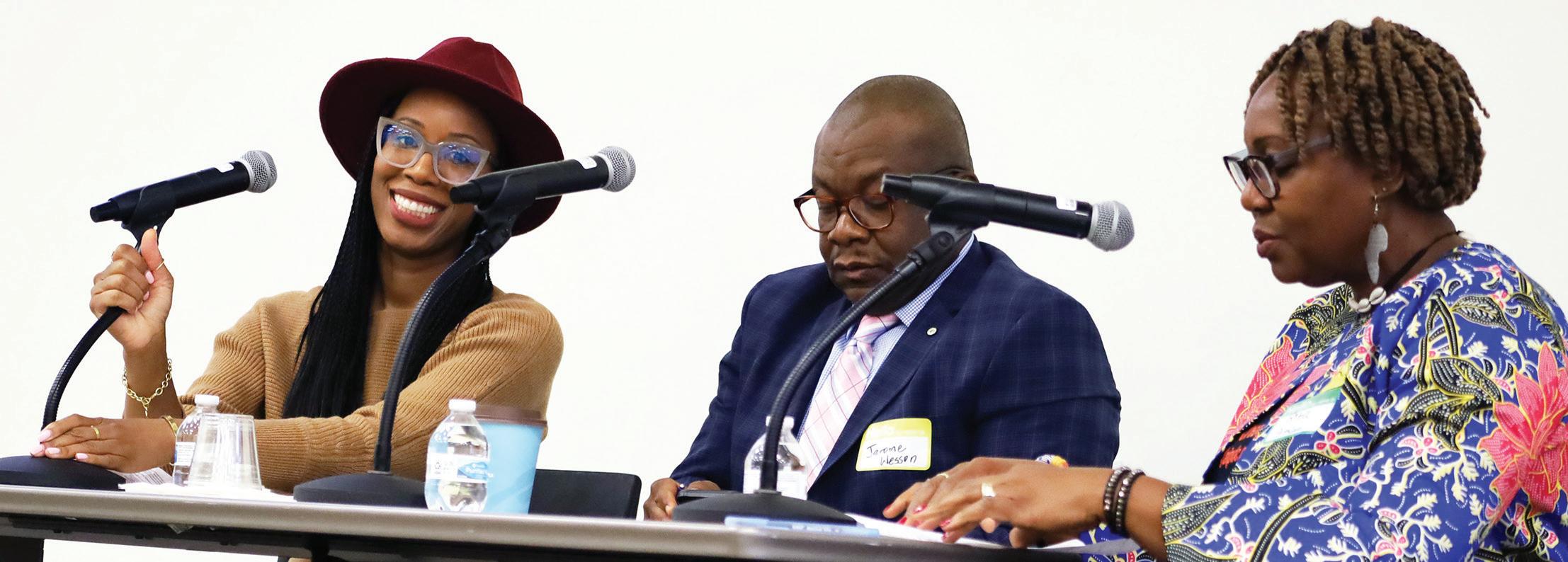
- The African Community Newspaper www.mshale.com October 10-16, 2022 Issue 5438Mshale
(L to R) Wokie Daboh, the director of diversity and inclusion at ESPN, Jerome Wesson of Boston Scientific and moderator Rita Apaloo during a keynote panel at the African Immigrant Professional Development Conference on Saturday, October 1, 2022 held at North Hennepin Community College.
Photo: Panashe Matemba-Mutasa/Mshale
Professionals Continued from Pg. 6
Religion
Nonreligious women of color convene to talk Christian nationalism, reproductive rights
By Alejandra Molina Religion News Service
Dozens of nonreligious women are gathering this weekend in Chicago for “Women of Color Beyond Belief” to dis cuss the effects of Christian nationalism and the overturning of Roe and to show case the voices of younger generations who are increasingly rejecting religion.

The conference, which began in 2019, comes as recent surveys show an explo sion of Americans who are religiously unaffiliated — up 10 percentage points in a decade. As of 2021, nearly 3 in 10 Americans are unaffiliated (29%), com pared with 19% in 2011. Many are young people: Some 35% of younger millennials are unaffiliated.
Commonly referred to as “nones” (for their “none of the above” reply to ques tions about their connections to faith com munities), religiously unaffiliated people cover a wide range of beliefs, comprising atheists, agnostics, humanists and secu larists.
To Sikivu Hutchinson, an atheist activist and a core organizer of the conference, it’s important to understand “what are the catalysts for that rejection (of organized religion) within Gen Z communities?”
Secular and atheist spaces have long been largely white and dominated by men. This leaves a lot of concerns out of the conversation, said Hutchison. She believes it’s crucial to center women of color, particularly Black and Latina voices, and to give center stage to issues such as reproductive rights and what Hutchin son regards as an assault on LGBTQ rights, critical race theory and anti-racist education.
stereotypes about who secular folks are.”
Presented by the LA-based Black Skep tics Group, the Atlanta-headquartered Black Nonbelievers and South LA’s Wom en’s Leadership Project, this year’s con ference theme is “Hands off our Bodies!,” emphasizing the collective’s commitment to reproductive rights and contraception.
Among the speakers are Charis Hoard, a secular activist who will be leading a pre sentation on American religious extrem ism in public policy and society; Suandria Hall, a mental health counselor whose practice, My Choice My Power Counsel ing, focuses on life transitions and reli gious trauma; and Karina Quintanilla, who in 2020 was the first Latina elected to the City Council in Palm Desert, a Riverside County city in Southern California.
For Bridgett “Bria” Crutchfield, a main organizer of the convening, the gather ing serves as a lifeline for nonreligious women in rural areas “where they don’t have outreach available to them.”
“Being able to come out and commune and congregate with like-minded women, it reaffirms that you’re not alone, because oftentimes, this is a lonely journey,” Crutchfield said.
was also disturbed by how her pastor characterized a church member’s death from breast cancer as her “final healing.” Crutchfield wondered, “There’s levels to healing?” Crutchfield turned to the Bible after leaving the church but found herself disagreeing with much of the Scripture she was reading.
She sought secular spaces when she began to embrace atheism. “I had a lot to learn,” she said. She wound up creating a group for minority atheists and eventu ally established the Detroit-area affiliate of Black Nonbelievers.
These are the kind of life experiences that Belen Padilla, 19, a student at Scripps College in Southern California, is eager to learn more about at the confer ence. Padilla, a Mexican American who identifies as queer and atheist, grew up in a Catholic household and said most atheists she knows are white. Padilla is a recipient of the Black Skeptics’ scholar ship fund.
Padilla recalls using Google at a young age to ask, “Is it OK to not believe in God?”
For Padilla, being queer and atheist are thought as going against her culture. “It’s very hard for people to understand where I come from,” she said.
identity and said that partaking in Women of Color Beyond Belief has shown her ”there’s a lot more out there.”
“It kind of inspired me, seeing that there are people who still believe in doing good, not in the name of God, but just because it’s the right thing to do,” said Nelson.
Mandisa Thomas, who wasn’t formally raised in any church, is one of them.
Thomas, the founder and president of Black Nonbelievers, said she was raised with a secular perspective and was exposed to different religions such as Christianity and Islam. She was indoc trinated into the Black conscience com munity and early on learned about racism and injustice.
While Thomas mostly saw herself as spiritual, not religious, she began to bet ter understand her identity as an atheist humanist around her mid-30s.
To Thomas, a core organizer of the con ference, it’s crucial, as nonreligious peo ple of color, to openly speak about Chris tian nationalism and reproductive justice because they are directly impacted by these issues.
“It cannot all be focused on church and state separation. That’s not going to work for people of color, specifically women of color,” said Hutchinson, who more than a decade ago founded Black Skeptics Los Angeles.
As data show that Black and Latin American “nones” are growing, Hutchin son said they’re trying to “debunk those
While the number of religiously unaffili ated is on the rise, people of color in the U.S. are still more likely to be religious than white Americans. Data show that 49% of white Americans have said reli gion is very important in their lives, com pared to 59% of Latinos and 75% of Black Americans who said the same.
Crutchfield, who was raised Jehovah’s Witness and later began attending an Apostolic Pentecostal church, left Chris tianity as an adult. She was stripped from a leadership position after questioning the church’s financial structures. She
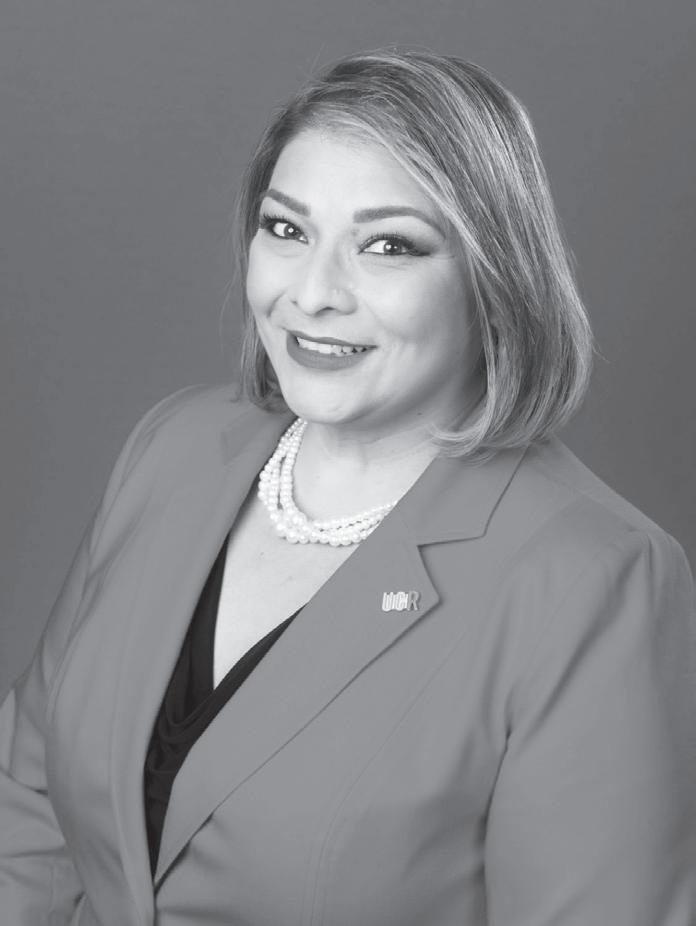
Kaylin Nelson, 18, a student at the University of Central Florida, said getting to know others who didn’t grow up in a religious Christian household like hers “has restored my faith in humanity.” Nel son was sexually assaulted at church at a young age and said she saw “a lot of protection of abusers” as well as people “putting the blame on God.” That pushed her away.
Nelson, who also received a scholar ship from Black Skeptics’ scholarship fund, is learning more about her secular
“We advocate for an evidence-based approach to what we do in life. … Our per spective is that this is the world we live in. We have to make sure it’s a better place for ourselves and for future generations,” Thomas said.
Mshale
- The African Community Newspaper www.mshale.com October 10-16, 2022 Issue 543Mshale 9
Women of Color Beyond Belief Conference organizers
Bridgett “Bria” Crutchfield, from left, Sikivu Hutchinson and Mandisa Thomas pose together during the group’s meeting in 2019 in Chicago.
Photo: Josiah Mannion via WOCBB
Karina Quintanilla
Photo: Courtesy City of Pal City
Text Club: Text AFRICA to 24587 to join
Art & Entertainment
Review: Gili Yalo melds Ethiopian with many musical styles during Cedar show
By Maureen Smith Martindale Mshale Contributing Writer
Ethiopian-Israeli singer Gili Yalo and his five-piece band Saturday got everyone on the dance floor hopping to music that blurs boundaries between blues, jazz, funk, reggae, and traditional Ethiopian.
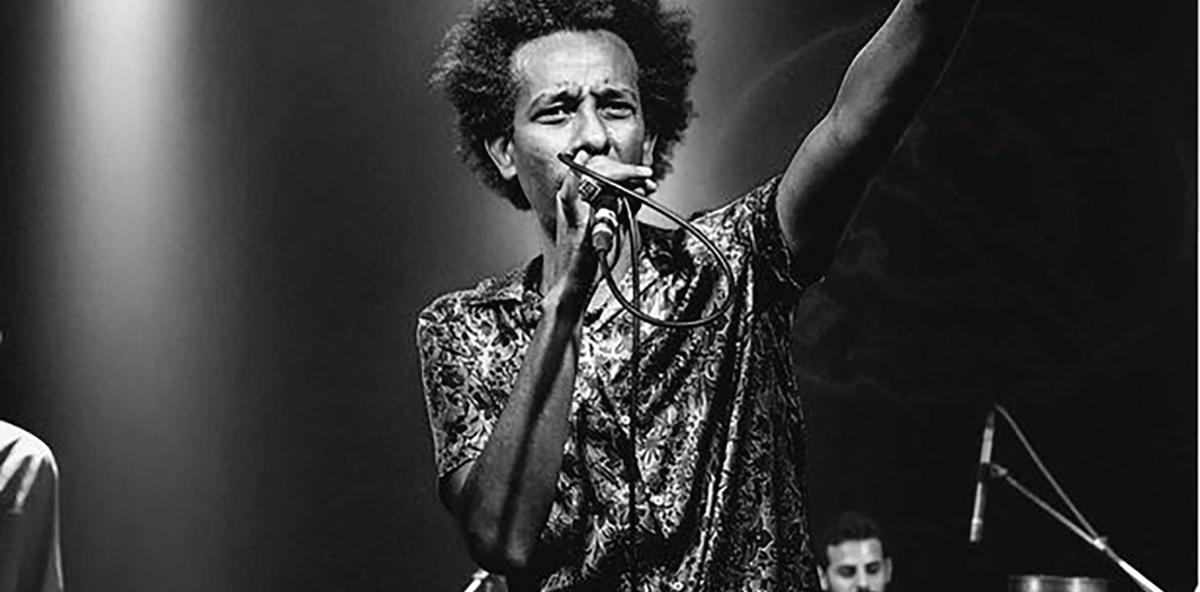
“Ladies and gentlemen, I want to take you to Ethiopia. Do you want to come to Ethiopia?” he asked the audience during the Cedar Cultural Center concert. A few songs later, he coaxed, “Clap your hands higher. Come closer, I want to try something with you. Are you ready?”
The audience approached the stage. Yalo, who has performed worldwide, seemed to tower above the dancing crowd. They jumped in sync as he leapt up and down and shook his hips and shoulders to the beat. He had emerged on stage wearing a bright yellow and black checked jacket, then shed it not long after the first few songs.
He’s been singing soulful, healing music ever since escaping famine in Ethiopia with his family as a young boy. They were among Ethiopian Jews covertly evacuated under Operation Moses in 1984. After
they settled in Israel, he began performing worldwide as a soloist with the Jerusalem Boys Choir. As a young adult, he sang for seven years with a band, then launched his own band in 2017.
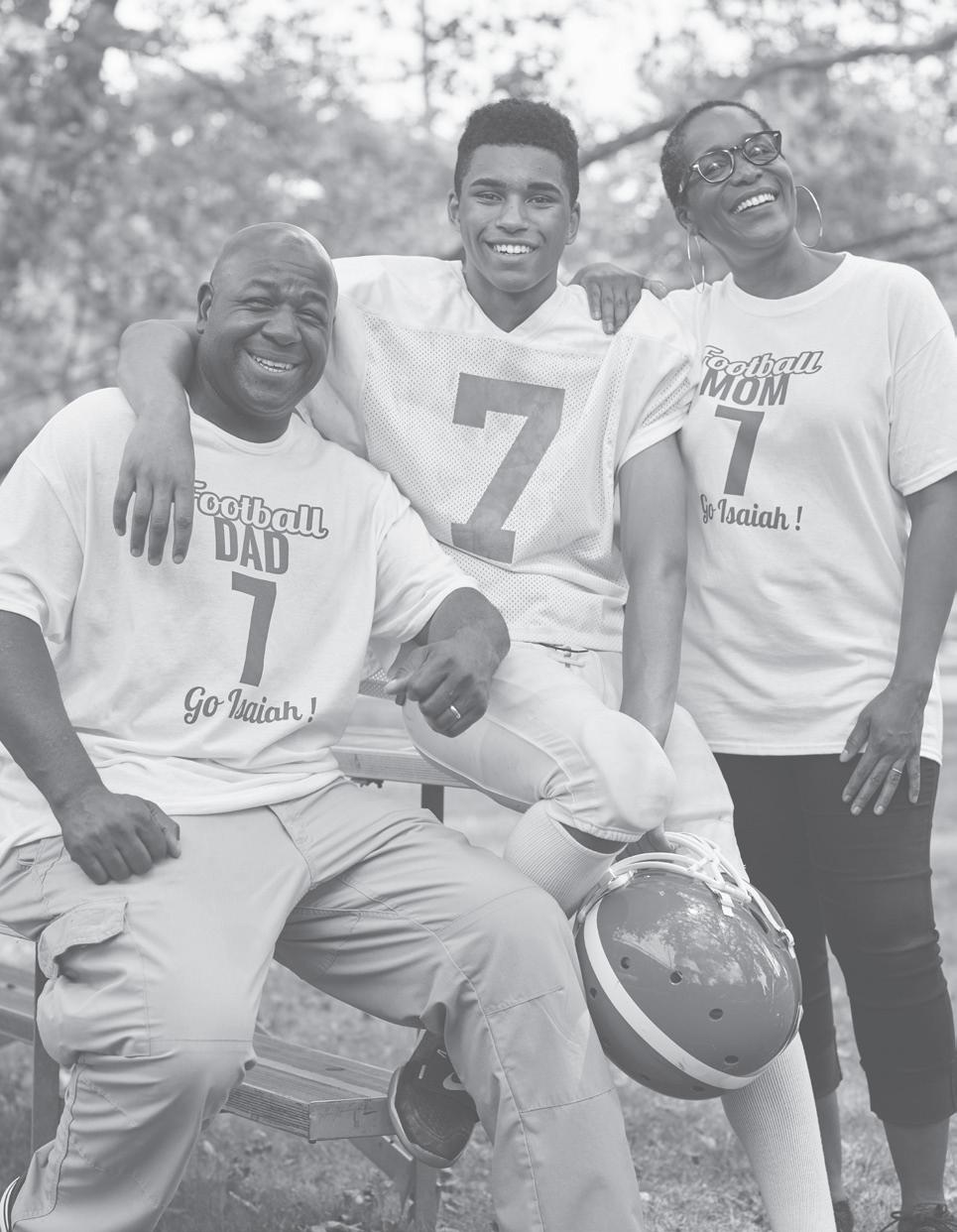
On Saturday he sang songs that evoked hints of mournful blues, reggae rhythms, jazz tones and funky beats, still while retaining Ethiopian flare and characteristics such as melodies and chords based on minor pentatonic scales.
“The music I compose, I try to write without boundaries,” he told the audience. His lyrics are in English, Amharic, and occasionally Hebrew. “Ethiopian songs (are still) very precious for me from my childhood.”
He and his band performed recent songs including Hylooga, as well as Tadese, Selam, Sab Sam, Hot Shot, Coffee and Fire from the Gili Yalo 2017 debut album, and Sew Lesew and Zelel Zelel from Made in Amharica, a 2019 collaboration with Dallas-based musicians at Niles City Sound recording studio.
Fanaka Nation opened the concert, and the lead singer went back on stage to rap a few lines during one song with a warm invitation from Yalo. “This next song, Selam, is the first song I ever wrote
in Amharic,” Yalo said. The two danced and jammed on stage with the band.
Gili Yalo’s tour included performances at global music festivals and venues in Georgia, Indiana, Vancouver, and the Kennedy Center in Washington D.C., and was to conclude Oct. 3 in Chicago. Yalo planned to return home to Tel Aviv for a month, then begin another tour with his band, including Nadav Peled on guitar, Dor Heled on keys, Billy Aukstik on trumpet, Peter Kronreif on drums, and Geoffrey Muller on bass.
In a new thrust, Yalo is creating experimental spiritual music, even writing lyrics in Ge’ez, an ancient Semitic language now spoken only by rabbis and a few in the Jewish community. The inspiration came in part when his mother, a very spiritual person, passed away several months ago.
“I’m not a typical Ethiopian musician,” he said in an interview before the show. “I’m trying to create my own world, not trying to imitate. That’s the most important thing to me.”
- The African Community Newspaper www.mshale.com October 10-16, 2022 Issue 54310Mshale
His first
football season, Isaiah told us,
‘Wear
a jersey with
my name
on it. I want
everyone
to
know you’re here for me.’ Darnell and Denna, adopted 16-year-old Isaiah YOU CAN’T IMAGINE THE REWARD LEARN ABOUT ADOPTING A TEEN ADOPT US KIDS .ORG
Gili Yalo
Photo: Courtesy of Gili Yalo
Unite to Fuel Change
We live in a world where divisions and poverty affect everyone but when we unite as changemakers we can create a community where all people thrive.

- The African Community Newspaper www.mshale.com October 10-16, 2022 Issue 543Mshale 11
JOIN THE MOVEMENT VISIT
GTCUW.ORG
TO
LEARN
MORE






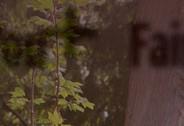


- The African Community Newspaper www.mshale.com October 10-16, 2022 Issue 54312Mshale You Fair Housing A Better Community The solution to housing discrimination starts with you. If you have been trying to buy or rent a house or apartment and you believe your rights have been violated, contact HUD or your local fair housing center. The Fair Housing Act prohibits housing discrimination because of race, color, sex, religion, national origin, familial status or disability. + Fair Housing Is Your Right. Use It. Visit www.hud.gov/fairhousing or call the HUD Hotline 1-800-669-9777 (English/Español) 1-800-927-9275 (TTY) A public service message from the U.S. Department of Housing and Urban Development in partnership with the National Fair Housing Alliance. The federal Fair Housing Act prohibits discrimination because of race, color, religion, national origin, sex, familial status or disability. For more information, visit www.hud.gov/fairhousing. SCAN HERE FOR MORE INFO












 By Tom Gitaa Mshale
By Tom Gitaa Mshale





 By Panashe Matemba-Mutasa Mshale
By Panashe Matemba-Mutasa Mshale














